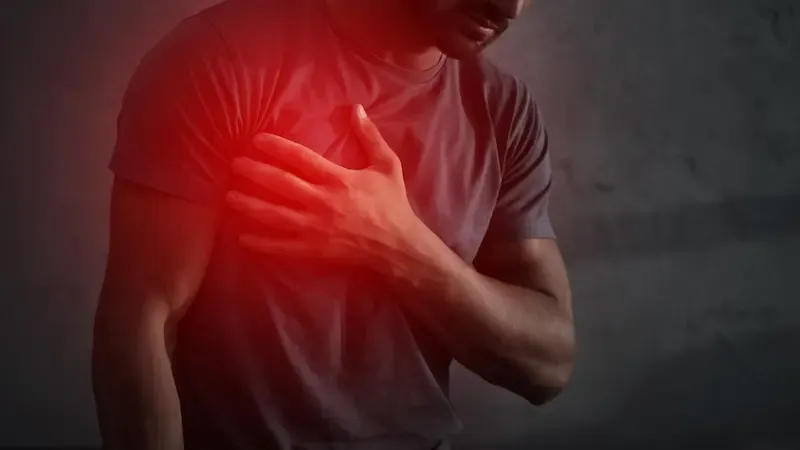When we think of heart attacks, dramatic scenarios often come to mind — sharp chest pain, clutching our hearts, and calling for help. But what if I told you that the signs are not always so obvious? In fact, many people experience subtle symptoms that can easily be overlooked or misinterpreted. Recognizing these warning signs can be the difference between life and death. It’s crucial to educate ourselves about the range of symptoms that might indicate heart stress.
Time is of the essence when it comes to heart health. The sooner you recognize potential issues, the better your chances of receiving timely medical intervention. Whether you’re a fitness fanatic monitoring your performance or someone simply looking to maintain good health, staying informed about these hidden clues is essential. Join us as we uncover seven surprising signs that could point to an impending heart attack — because understanding your body could save your life.
Unusual Chest Discomfort
When most people think about heart attack symptoms, the image of sudden, excruciating chest pain often comes to mind. However, there’s a wide spectrum of chest discomfort that can indicate something more serious happening within your body. Unusual chest discomfort may not feel like the classic “elephant sitting on the chest” sensation; instead, it might present as pressure, squeezing, or even a strange fullness that cannot be brushed off easily. Recognizing this atypical discomfort is crucial for timely intervention.

Imagine going about your daily routine — perhaps you’re folding laundry or sitting at your desk — when suddenly you feel an unfamiliar heaviness in your chest. This sensation isn’t sharp or localized; it feels almost as though there’s weight pressing down and might even cause mild anxiety. Such sensations can easily be dismissed as indigestion or general fatigue, yet they are vital signals from your body trying to communicate potential trouble with the heart. It’s essential to listen when something deviates from what you consider “normal,” since many heart attacks manifest quietly rather than dramatically.
Moreover, the nature of this unusual discomfort can fluctuate; it might come and go or linger persistently over hours or days without escalating into severe pain. Many individuals report feeling just a slight unease during mundane activities instead of overt distress — a warning sign that could be mistaken for mere stress or exhaustion. For instance, while working out at the gym, you may experience greater tightness across your chest than usual or find yourself having difficulty catching your breath during otherwise manageable workouts. These signs shouldn’t be shrugged off but recognized as potentially significant indicators that merit further investigation.
Understanding these variations in how chest discomfort can present itself empowers you to act decisively if needed. You don’t need to exhibit all typical symptoms associated with heart problems for blockages or issues to exist — they could emerge through unexpected protective layers built upon an individual’s unique health narrative. Therefore, being attuned to these subtle changes provides an opportunity for early detection and increased chances of effectively managing any impending cardiac events before they escalate beyond control.
Sudden Shortness of Breath
Experiencing sudden shortness of breath can be alarming, especially when it occurs without any notable exertion. Many people associate shortness of breath with physical activity or strenuous effort, but this symptom can appear unexpectedly, catching individuals off guard. Whether you’re standing in line at the grocery store, relaxing on the couch, or even sleeping peacefully, an unexplained bout of breathlessness may hint at something more serious happening within your body — specifically, your heart.
The connection between respiratory issues and potential heart distress is crucial to understand. While conditions like asthma or chronic obstructive pulmonary disease (COPD) can cause difficulty breathing, it’s essential to recognize that heart problems often present similar symptoms. When the heart struggles to pump blood efficiently due to blocked arteries or other cardiovascular conditions, it can lead to fluid accumulation in the lungs — a situation known as pulmonary congestion. This build-up not only hinders oxygen exchange but also triggers an urgent sensation of breathlessness that might leave you feeling panicked and disoriented.

Consider a scenario where someone is sitting comfortably while watching television when they suddenly feel as though they can’t catch their breath. Despite no recent exercise or stressors around them, they might chalk it up to a panic attack or anxiety. However, if such episodes occur repeatedly — especially alongside other signs like chest discomfort or fatigue — it’s critical not to dismiss these incidents outright. The body sends signals for a reason; ignoring them could result in delayed medical attention during a time when prompt action is vital for survival.
Overall, understanding the warning signs associated with sudden shortness of breath could be lifesaving. Instead of attributing these moments purely to anxiety or fatigue, take note of their frequency and intensity. If you experience this unsettling symptom regularly without clear explanation or if it becomes persistent and severe — that’s your cue to reach out for medical help immediately. Your awareness and timely response could make all the difference in managing your cardiovascular health effectively.
Nausea or Vomiting
When we think about heart attacks, our minds often jump to overt physical symptoms such as crushing chest pain or shortness of breath. However, nausea and vomiting can also signal a serious cardiac event, especially when they occur in conjunction with other warning signs. It’s not uncommon for individuals experiencing a heart attack to mistake these gastrointestinal issues for something less severe, such as indigestion or the flu. This confusion can lead to dangerous delays in seeking medical help.

For example, many people might recall the story of someone who felt unwell after a hearty meal, only to dismiss it as food poisoning. In reality, this individual was experiencing early signs of a heart attack that manifested through stomach discomfort rather than typical chest pains. The mind-body connection is profound; our cardiovascular system doesn’t always adhere to textbook symptoms, making it crucial to remain vigilant about how our bodies communicate distress signals.
Furthermore, nausea can be accompanied by other subtle warnings like excessive sweating, fatigue, or lightheadedness – all potential indicators of a heart issue rather than mere digestive troubles. Not everyone will experience classic symptoms; some may simply feel an unexpected wave of queasiness that leaves them feeling uneasy. Recognizing that these sensations could denote a looming health crisis is vital for swift intervention and better outcomes.
So, if you find yourself grappling with unexplained nausea or vomiting — especially alongside any additional concern like discomfort in other areas — it’s essential not to brush off these signals lightly. Instead of attributing your symptoms solely to dinner’s aftermath or stress from daily life, consider seeking medical advice promptly if these feelings persist. Your body has its own way of alerting you when something isn’t right — don’t ignore it!
Pain Radiating to Other Areas
Many individuals have reported discomfort in their arms — especially the left arm—along with other locations such as the back, neck, jaw, and even stomach. This phenomenon is referred to as “referred pain,” where the brain misinterprets signals from various body parts due to shared nerve pathways. Ignoring these atypical forms of discomfort could mean overlooking critical warning signs.

For example, someone might experience sudden, gripping pain in their jaw or a tight sensation in their upper back that they chalk up to stress or poor posture. A common yet alarming situation involves an individual thinking they are simply having a dental issue when, in reality, they could be experiencing early symptoms of a heart attack. This underscores the importance of not dismissing feelings of soreness or pressure in areas outside of the chest; recognizing these subtler indicators can potentially save lives.
The connection between varied pain sites and heart health is well documented but often underappreciated by both patients and healthcare providers alike. Psychological studies suggest that women may experience this referred pain more distinctly than men during a heart attack. Therefore, it becomes even more vital for caregivers and health-conscious individuals to educate themselves on these atypical presentations. Being aware of how your body communicates distress can lead you towards timely medical intervention when facing what may feel like benign discomfort.
Therefore, if you find yourself experiencing unexplained pains radiating through your arms, neck, jaw, or back — particularly if coupled with other alarming symptoms — it’s important to treat those sensations seriously. These signs demand urgent attention because they could indicate underlying cardiac issues that require immediate care. Always err on the side of caution: recognizing and responding to such indicator pains can make all the difference in safeguarding your health.
Extreme Fatigue
When we think of fatigue, it often correlates with our physical activity levels or a long, exhausting day at work. However, one of the more insidious signs of a heart attack is extreme fatigue that seems disproportionate to any recent exertion. This type of exhaustion can strike suddenly and manifests as an overwhelming sense of tiredness that lingers regardless of how much rest you’ve had. Many individuals describe this kind of tiredness as feeling like they are wading through thick mud — simple tasks become monumental challenges when your body simply refuses to cooperate.

This unexplained fatigue may linger for days and can be accompanied by a general malaise that leaves you questioning your overall health. For instance, someone who usually feels invigorated after a workout might find themselves needing several hours to recover from a brisk walk. Ignoring this sign can be detrimental since extreme fatigue can signal that your heart is struggling to supply enough blood and oxygen to meet your body’s demands.
Moreover, studies indicate that women are particularly prone to reporting unusual fatigue leading up to a heart attack — sometimes even several weeks prior. It’s crucial for caregivers and loved ones to pay attention if someone in their lives starts exhibiting these signs without clear justification. If previously robust family members start canceling activities due to unexplained tiredness, it may warrant further investigation rather than attributing their symptoms solely to aging or stress.
In sum, while everyone has occasional bouts of tiredness, an extreme level of fatigue paired with other symptoms could indicate something more severe. If you’re noticing that exhaustion persists despite an adequate amount of sleep or relaxation — especially if it’s accompanied by other unexpected symptoms—it’s advisable not just to brush it off but seek medical guidance promptly. Your awareness could make all the difference in early detection and timely intervention when it comes to heart health.
Cold Sweats or Dizziness
When it comes to recognizing heart attack symptoms, cold sweats and dizziness are often dismissed as mere inconveniences. Many people might associate profuse sweating or feeling lightheaded with anxiety, stress, or even a common illness, without considering the possibility that these could be serious signs of cardiac distress. In fact, when someone experiences sudden sweating that feels unnatural — like they just stepped out of a sauna — it’s crucial to pay attention. This “cold sweat” can be one of the body’s ways of signaling that something is amiss, particularly in conjunction with other symptoms.

Dizziness can also catch individuals off guard; many may feel lightheaded after standing up too quickly or during moments of personal stress. However, when this sensation comes on suddenly and isn’t linked to physical exertion or dehydration, it may warrant further investigation. For example, consider an active individual who suddenly finds themselves unable to maintain their balance for no apparent reason — this is not just fatigue manifesting but could indicate an oxygen deficit related to heart function. Recognizing these sensations is important because they represent fundamental physiological changes initiated by the heart’s struggle to operate under stress.
Moreover, being aware of these symptoms is particularly critical for those at risk due to factors like family history, high blood pressure, or diabetes. If you find yourself experiencing cold sweats accompanied by dizziness — especially if it occurs alongside chest pain or radiating discomfort — the urgency of seeking medical attention cannot be overstated. Our bodies communicate through symptoms like these; dismissing them could mean missing out on timely intervention that saves lives.
Ultimately, understanding that cold sweats and dizziness can signal a deeper issue within your cardiovascular system should prompt proactive health monitoring. Keeping a keen eye on your body’s cues allows you not only to prioritize your well-being but also positions you better for making informed decisions about seeking medical advice promptly. By recognizing these subtle yet alarming signs as potentially serious red flags rather than casual irregularities will empower you to act swiftly in times where every minute counts.
Anxiety or Feeling Impending Doom
While physical symptoms like chest pain or shortness of breath are commonly associated with heart attacks, it’s crucial to acknowledge the psychological signals that may accompany these potentially life-threatening events. Many individuals may experience an intense feeling of anxiety or a sense of impending doom prior to a heart attack, which can often be overlooked in favor of more visible indicators. It’s important to recognize these emotional states as significant warning signs rather than mere stress or panic caused by everyday life.

Imagine you’re going about your day when suddenly you feel inexplicable dread washing over you — an overwhelming sensation that something isn’t right. This is not just ordinary anxiety; it’s what some experts refer to as “precordial catch syndrome,” where intense anxiety might precede cardiac distress. One study indicated that almost 50% of people who have experienced a heart attack reported feeling an ominous foreboding before their symptoms began. Recognizing this emotional turmoil can provide insight into what your body might be signaling and could serve as a critical prompt to seek help.
Taking feelings of anxiety seriously means paying attention to how they interact with your physical symptoms. For instance, if you find yourself both anxious and experiencing unexplained fatigue or discomfort, it’s essential not to dismiss those emotions as merely psychological stressors. They could indicate that your heart is struggling in ways that manifest through both sensory and emotional experiences. Rather than attributing these sensations solely to anxiety disorders or situational stressors, consider them as valid inputs for evaluating your heart health.
Also, being aware of the interplay between mental state and physical well-being empowers individuals to be proactive about their health. If you’re habitually managing anxiety but suddenly notice heightened levels along with any other unusual symptoms, don’t hesitate — reach out for medical advice immediately. Ultimately, maintaining vigilance about both the emotional and physical signals your body sends can lead to timely intervention and better outcomes when facing potential cardiac complications.
Prioritize Your Health: Recognize the Signs
In summary, being aware of the surprising signs of a heart attack is crucial. Symptoms like unusual chest discomfort, sudden shortness of breath, and extreme fatigue can often be overlooked. Each sign matters and could signal a serious health concern that requires timely intervention. By understanding these indicators, you empower yourself to take action.
Don’t wait for symptoms to escalate. If you notice any of these warning signs in yourself or someone else, seek medical help immediately. Prioritizing your health means taking every signal seriously. Stay informed and proactive — your heart will thank you for it!





